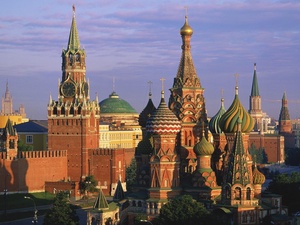
Joint letter – ICC reform and expansion risks diverting ETS Revenues from real climate action
In light of the European Commission’s ongoing considerations to amend the ETS State Aid Guidelines, revising the rules for Indirec...
News

Publish date: October 9, 2018
News
Unbridled climate change will bring drought, mass flooding, hunger and epidemics. Rising temperatures will contribute to pollution and swathes of the populace will be exposed to disease through contaminated drinking water. People in urban areas, trapped in overheated buildings, will sap energy resources and contribute to water supply shortages. In some places, the heat will get so bad that it will deform railroads, causing trains to derail.
That’s not a quote from the terrifying report released Monday by the United Nations scientific panel on climate change – though many of those predictions are contained within that international cry of alarm.
Rather it’s the assessment of Russia’s Ministry of the Natural Resources, which landed in draft form at 900 pages last month.
The complete report isn’t due until the end of the year, but the Ministry’s candor is surprising given the Kremlin’s persistent claim that the Russian economy stands to cash in big on a warming climate.
Moscow has long banked on a decrease in sea ice to open navigation through the Arctic on a year round basis. A warmer temperature would also allow for more economic activity in the colder months, the Kremlin says. Construction sites that stall during the harsh winters would bustle again, and transport interruptions due to ice and snow would become less frequent. The agricultural sector would boom because of longer growing seasons.
Moscow routinely cites these claims to excuse its sluggish response to the demands of the Paris Climate Agreement – which it has signed but not yet ratified – all while it casts blame on other countries for producing more greenhouse gasses than it does.
But no longer – at least as far as the Ministry of Natural Resources is concerned.
According to its draft report – Russia is the world’s fourth biggest contributor to worldwide greenhouse gasses, behind China, the United States and India.
And contrary to Putin’s public ambivalence over the causes of climate change, the Ministry says human activity is to blame.
This activity, says the report, has “led to unprecedented, at least in the last 800,000 years, levels of atmospheric concentrations of carbon dioxide CO2 methane and nitrous oxide.”
What’s more is that the effects of all this are hitting Russia now. The concentrations of greenhouse gasses in the country – which the Ministry says have been driven by growth in the economy and the population in the last two centuries – reached record levels in the past year alone.
This has led to verifiable increases in mortality, says the Ministry. Between 2016 and 2017, the number of people in Russia who died from environmental catastrophes, like floods and wildfires, spiked by 11 times.
And it only stands to get worse, warns the Ministry. Melting permafrost in and around the Russian Arctic, the report says, could lead to “dangerous chemical, biological and radioactive substances entering the human habitat.”
Forest fires in Siberia, which are already a regular occurrence, stand to become yet more frequent. Regions in southern Russia are primed to become hotbeds of disease thanks to insects and contaminated water, and the country’s elderly population could be withered by heat waves.
Cities will offer no respite. The report suggests that the “overheating of buildings during heat waves causes increased energy consumption and contributes to energy and water supply emergencies in the urban population.”
Then there’s the question of Russia’s extensive railroad network, which, in Russia’s southern areas, the ministry predicts will warp and buckle in the increasing heat, sending trains off the tracks.
So what is to be done?
On that the report doesn’t have much to offer. So far, the Russian government has set aside $22 billion to promote air pollution reduction, reforestation, and recycling.
But on a policy level, the Moscow continues to promote coal, and Russia’s entire economy rises and falls with the price of oil. If it’s the Ministry’s responsibility to exert its influence on these policies, it doesn’t look like its working. Sergei Lavrov, Russia’s foreign Minister, twice postponed ratifying the Paris Accord in 2017 alone, saying most recently that Moscow will get around to it sometime before 2020.
Which might be why the release of the Ministry’s disturbing report was accompanied by lots of chatter from anonymous officials within the Ministry itself.
One of those officials, identified only as a government source, told the business daily Kommersant that the report’s release was a kind of hopeful plea to be taken seriously.
He or she said that such climate reports are a yearly responsibility of the Ministry, but that this year’s dramatic focus on exactly what climate change will mean for the country’s future was meant to grab attention and establish some credibility.
“That’s why they’re laying the groundwork,” the government source told the paper. “So that [the Ministry] could cite their report when needed.”
Whether that groundwork will hold is anyone’s guess – but following the stunning announcements from the United Nations on Monday, the timing couldn’t have been better.

In light of the European Commission’s ongoing considerations to amend the ETS State Aid Guidelines, revising the rules for Indirec...

Today, the European Commission published a series of Carbon Border Adjustment Mechanism(CBAM)-related documents including two legislative proposals a...

Today, the European Commission published its European Grids Package, presented as an upgrade of the EU’s energy infrastructure to lower bills and boo...

The European Commission is set to publish the the Grids Package on December 10th, the different legislative proposals and secondary legislations rela...

Today, the European Commission adopted a new Union list of energy Projects of Common Interest (PCIs) and Projects of Mutual Interest (PMIs), granting...
Get our latest news